As 'He's Just Not That Into You' Turns 20, Its Authors Reflect on Just How Much (and How Little) Dating Has Changed
Liz Tuccillo and Greg Behrendt reflect on their self-help book that sparked a break-up revolution and became a pop culture phenomenon.

In the season 6, episode “Pick-a-Little, Talk-a-Little” of Sex and the City Carrie, Charlotte, Samantha, and Miranda do something they rarely consider: seek dating advice from a man. When no-fuss Miranda can't comprehend why the man she went on a promising date with wasn't calling her, Carrie's boyfriend Berger spells it out. "He's just not that into you,” he says. Miranda’s relieved to hear something so simple—liberated from weeks of hand-wringing by the phone—while her cosmopolitan-sipping friends are flummoxed. The sentiment quickly reverberated across America's single women.
The revelation on the 2003 episode was the brainchild of Liz Tuccillo and Greg Behrendt, who were writers on the hit HBO show. The two stumbled onto the concept in the writers’ room when a colleague was asking for advice on why she hadn’t heard from a recent date. The show’s resident cisgender, straight male writer, Behrendt, said the now iconic line—leading to shockwaves and debate among their coworkers, and ultimately the creation of the SATC bit. It eventually inspired him and Tuccillo to write He’s Just Not That Into You, the 2004 no-bullshit dating manual that sparked a revolution of boundaries and breakups.

Carrie (Sarah Jessica Parker), Berger (Ron Livingston), Samantha (Kim Cattrall), Charlotte (Kristin Davis), and Miranda (Cynthia Nixon) in the season 6 Sex and the City episode "Pick-a-Little, Talk-a-Little."
This September 1 marks two decades since He’s Just Not That Into You hit shelves and shook up the dating world, examining love from a straight man and woman’s perspective. In the book, Behrendt responds to questions in an uncompromising, yet supportive tone, reminding the reader of their worth; Tuccillo chimes in on why it’s difficult to accept the truth or let go of a lackluster relationship. Each chapter ends with a worksheet for readers to apply these lessons to their lives.
Their advice felt groundbreaking, though Tuccillo admits to Marie Claire in a recent interview that “it’s not rocket science.” With the book’s messaging, encouraging resilience and self-compassion, its concepts stormed conversations between girlfriends and ignited cultural combustion, resulting in an Oprah Winfrey approval stamp, a Gilmore Girls reference, a follow-up published in 2006, and even a 2009 feature film of the same name starring every heartthrob of the era (Scarlett Johansson! Drew Berrymore! Jennifer Aniston! Bradley Cooper!).
But back in 2004 when He's Just Not That Into You came out, straight women were still mostly waiting by landlines. Now, dating couldn't look more different, from the dawn of social media and dating apps to the pool being flooded by more accomplished women than ever struggling to find men who meet their expectations. But even still, many have the same gripes as those who once read Behrendt and Tuccillo's treatise—just look at the viral TikTok trend of teary-eyed women complaining about bad first dates, lack of communication, ghosting, breadcrumbing, love bombing, or how hard it is to meet someone IRL.
In honor of He’s Just Not That Into You turning 20, Marie Claire spoke to Tuccillo and Behrendt about the book’s legacy, what they would change if they were drafting the book today, how to endure rejection, and if they think dating apps have (and haven’t) changed bad dating etiquette.

Charlotte (Davis) and Miranda (Nixon) react to hearing Berger say, "He's just not that into you."
Marie Claire: A pivotal moment in the Sex and the City writers’ room led to the creation of He’s Just Not That Into You. What happened and why did it feel so important?
Stay In The Know
Get exclusive access to fashion and beauty trends, hot-off-the-press celebrity news, and more.
Liz Tuccillo: There was a woman in the writer's room talking about a guy who wasn't calling her back when he promised that he would—she just never heard from him. There were all women in the room except for [showrunner] Michael Patrick King and Greg Behrendt, who was the only straight man. We’re just saying things like, ‘Oh, he might be intimidated,’ ‘He has mother issues,’ ‘He is getting over his ex-girlfriend,’ and excuses of why he didn't call. And Greg just went, ‘Yeah, no, I think he's just not that into you.’
We were so shocked that anyone said something like that. Then we started peppering Greg with questions. He just started batting all our excuses away. We were all so blown away as if it was the newest, groundbreaking idea that basically if a guy doesn't call you, he doesn't like you.It seems so obvious, but it felt so groundbreaking that at the end of it, I was like, Oh, I feel like this is a book.
Greg Behrendt: My thought process was, ‘You're missing the bigger point here. You're talking around this problem.’ Because they were friends and because we were all being honest, I'm like, ‘I've done this. He doesn't like you. He's just not that into you. I've done what you're talking about more than once and so have my friends. And it's not even about you really. This is what somebody is doing when they're blowing you off slowly and cowardly.’

Ginnifer Goodwin, Jennifer Aniston, and Jennifer Connelly in the He's Just Not That Into You movie adaptation.
MC: Twenty years later, what are your reflections on the book’s cultural impact?
Tuccillo: I'm proud we wrote something that ended up becoming part of the zeitgeist for a while. My reflection is that it happened to be an idea whose time had come. There were lots and lots of women making excuses for being in bad relationships or situations, and people were ready to hear it on some level.
You write a lot of things, but rarely do you write something and somebody will come up to you about it still years later. Every once in a while, somebody will say, ‘Your book helped me get out of a bad relationship and because of it, I met my husband.’ And that's like, Wow. I can write a lot of TV shows, but no one's going to say that.
Behrendt: When [Liz brought] the idea of the book up, I was like, ‘I don't think so.’ I was uncomfortable with it actually because I thought, ‘These women don't need my help.’ I feel that way about my wife. She doesn't usually need my suggestions. But Liz was adamant that this was a message that she thought would [resonate] with people. And then I even told my wife about it and my wife agreed. And so, I was like, ‘All right. But we have to be very careful about how we do this.’Originally Liz was like, ‘It needs to be you [to write the book].’ And I said, ‘It has to be us. There has to be a woman's voice in this.’ Liz was confident that something would happen with it, and I was like, ‘I just want to get it into Urban Outfitters.’
MC: Were there any unexpected surprises that came with the book's popularity?
Tuccillo: Our first interview for the book [was] on The Oprah Winfrey Show—for an hour. When our publicist called, I remember she was in the parking lot and screamed out, ‘Oprah wants you!’ She dedicated the entire episode to the book. And then for her to raise the book up in the air on her show and say, ‘Every woman in America needs to buy this,’ I mean, you don't have that happen every day.
We had to learn how to talk about the book quickly before the [Oprah] interview. We hadn't started learning how to brand it or market it or message it, and then they didn't have enough books. The bookstores ran out of books because no one was expecting that. It was stressful for a while to be like, ‘Are you kidding me? We have a book that everyone wants and no one can buy it?’ But that didn't last very long

MC: If you could go back to tell yourself one thing when you were drafting the book, what would you tell yourselves? Is there anything you wish you’d known?
Tuccillo: Not really because we hashed through all the different elements of it. We would sort of joke, ‘What's going to be the backlash? There must be a backlash because anything that's popular has a backlash.’ So, we just kept waiting for it, and it never happened because nothing we were saying was so shocking.
The biggest thing that we still felt a little uneasy about is [the chapter] ‘He's just not that into if he's not asking you out’ because that means so much. What that means now is even strange. But it was the only controversial thing that people would bring up in talkbacks because we're saying for women to not take the lead and to hold back and be giving the men the power. So, it felt uncomfortable. I still back it now, but it does feel uncomfortable.
MC: Is there any advice in the book that you wouldn't include today, or that seems especially outdated?
Tuccillo I would be more self-conscious about what a heteronormative, heterosexual binary book it is. We are talking about male-female dynamics, and the world really has changed since then. I'd be clearer on the context that the book is written in, not necessarily writing the book for all the different identities out there.
Behrendt: To be honest, not that I can think of. It wouldn't have done as well if it wasn't perfect the way it was when we did it for the time. I'm glad to have been a part of the movement to call men on their shit. I don’t want to get too political, but there's a war on women, and I feel like we've gone backward in a crazy way. I feel like there was a little bit more optimism when Liz and I wrote the book—that women were having their own say about stuff.
Liz was confident that something would happen with it, and I was like, ‘I just want to get it into Urban Outfitters.’
Greg Behrendt
MC: Do you think dating apps, particularly ones like Bumble where women message men first, have somewhat leveled power dynamics when it comes to dating?
Tuccillo: I think Bumble is kind of a gimmick because you could be the one who texts the man, but at the end of the day, if they don't get back to you, [or] if they are still talking to 12 other people, there's still room for very shady behavior. I don't think it really changes the dynamics that much.
In general, I think things have gotten harder. I think if the book didn't seem so dated, it would be very valuable now. I've dated online, and I think that there's so much bad behavior. In a way, dating apps bring out the worst impulses in all people. But as a straight woman, I focused on my experiences with lots of bad behavior by men.
Behrendt: I think dating apps have made [men] lazier. A man will do the least amount that he has to, to get what he wants. If he can do less, he will.
Tuccillo: The general feeling of the book is to have boundaries, have standards. And I think that that's essential when you're online dating.
MC: With social media and apps today, do you think the dating landscape has become more complicated? Or is the same issues presenting themselves in new ways?
Behrendt: I think it is a little ‘same T-shirt, different day.’ How you want to be treated and how you respect yourself applies everywhere. So that's true online as well: What you're willing to put up with and what seems like bullshit to you. If people don't want to get in person and be with you, they're not worth the time. It's [still] all about contact and being in-person.
Tuccillo: I think it is even more important that you have standards that you're judging people by and knowing very clearly what you want out of the situation, and what they're seeming to want out of a situation. When you go into online dating, you have to remind yourself: What does a guy look like, behave like, who's into me? Online dating is a numbers game, you have to really bat away the bad actors as quickly as possible to get to the ones that are there for the same reason you are there.

Scarlett Johansson and Drew Barrymore in the He's Just Not That Into You movie.
MC: The book ends with Liz talking about how hard it is to hold your standards high when you’re incredibly lonely. For the people looking to find a partner, what advice would you tell them to keep in mind, whether it's from the book or your personal experiences since the book was published?
Tuccillo: If you're serious about meeting people and you're mentally strong, you should try to meet people in real life and online and have a two-pronged approach. When one is getting too depressing, let the other one take control, go back and forth, or do both at the same time. I know that [with] dating online, there can be burnout, so you should pace yourself for the marathon and not the sprint.
The thing that got me through everything was having a good time with my girlfriends. You have to remember to be somebody who finds buoyancy and joy somewhere in your life because it is very, very, very difficult to date and look for love. It's hard and you have to be strong. It's almost going into battle. That's a little extreme, but you have to be strong. People are going to hurt your feelings. People are going to ghost you. People are going to be morally dubious, and you have to be strong and love yourself, and have your antenna up for getting rid of those people quickly and finding the ethical good people if that's what you're looking for.
Behrendt: I don't know who said dating was supposed to be fun. It's horrible and it has always been. Finding a partner is difficult. Finding even people that you connect with is difficult for everybody. Everybody says their city is the worst. Everybody says that their friend group is the worst. Everybody feels the exact same way, and everybody, including people you don't think would have problems, have problems. I've talked to some very famous, beautiful people who you'd be surprised to know have just ridiculous dating stories about how they've been fucked over. It's hard for everybody. That doesn't mean we quit. You have to laugh at it a little bit. You have to just have a good sense of humor about it and go, ‘Look, this is probably not going to work out, but I'll go on this date.’
I'm glad to have been a part of the movement to call men on their shit.
Greg Behrendt
MC: Two decades later, what are some of the most enduring dating lessons that still hold true?
Behrendt: A problem won't solve itself until you [have] solved your own problems. I can't tell you how many women who I've been with where they'll explain the story. It sounds hideous. You say it back to them and they're still like, ‘Yeah, I know, but I love him.’ And I'm like, ‘Well, I can't help you. I mean, I actually can't help you because you're not looking for better.’
Tuccillo: We were all so worried back then about meeting somebody and, ‘Oh, my God, it's never going to happen,’ and, ‘Oh, it seems so impossible.’ But most people end up getting married and having a family and it seems like it works out more than it doesn't. Even though it feels difficult and impossible, it happens all the time. People meet the person who they love, they get married, they have kids—it happens every day.
Liz is a freelance fashion and lifestyle journalist. With nearly 20 years of experience working in digital publishing, she applies rigorous editorial judgment to every project, without losing her sense of humor. A pop culture fanatic—and an even bigger book nerd—Liz is always on the quest to discover the next story before it breaks. She thrives at identifying cultural undercurrents and relating it to larger shifts that impact industries, shoppers, and readers.
-
 The Chicest Coats Are Hidden in the Sale Section
The Chicest Coats Are Hidden in the Sale SectionIncluding leather jackets, wool coats, must-have blazers, and shearling styles.
By Brooke Knappenberger Published
-
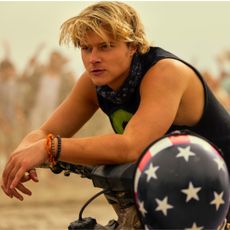 'Outer Banks' Fans Speculate Behind-the-Scenes Drama Led to a Beloved Character's Death—Here's What to Know
'Outer Banks' Fans Speculate Behind-the-Scenes Drama Led to a Beloved Character's Death—Here's What to KnowOne of the original Pogues has left the hit Netflix series.
By Quinci LeGardye Published
-
 32 Stunning Celebrity Red Lip Moments
32 Stunning Celebrity Red Lip MomentsThis rich hue has incredible variety and dimension.
By Katherine J. Igoe Published
-
 The Best Kristin Hannah Books, Ranked—From 'Firefly Lane' to 'The Nightingale'
The Best Kristin Hannah Books, Ranked—From 'Firefly Lane' to 'The Nightingale'Get your tissues ready.
By Nicole Briese Published
-
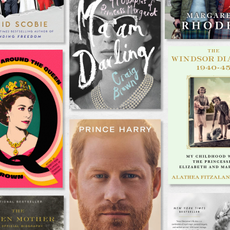 The 21 Best Books About the British Royal Family, From Tell-All Memoirs to Nonfiction Historical Titles
The 21 Best Books About the British Royal Family, From Tell-All Memoirs to Nonfiction Historical TitlesThey have more shocking revelations and juicy secrets than you saw on 'The Crown.'
By Andrea Park Published
-
 The 30 Best Mystery Thriller Books to Read in Fall 2024
The 30 Best Mystery Thriller Books to Read in Fall 2024As soon as you feel a chill in the air, you'll want to curl up with one of these page-turners.
By Andrea Park Published
-
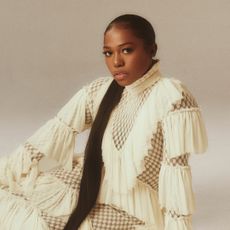 How Laci Mosley Turned "Scam Goddess" Into Her "True Con" Empire
How Laci Mosley Turned "Scam Goddess" Into Her "True Con" EmpireThe actress built a "con-gregation" with her popular podcast, and now she's expanding it with a new book.
By Quinci LeGardye Published
-
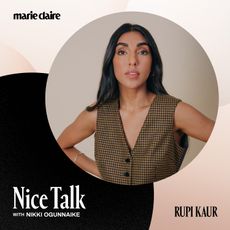 Rupi Kaur Reflects on Being Told Not to Self-Publish 'Milk and Honey'—But Feeling Empowered to Do It Anyway
Rupi Kaur Reflects on Being Told Not to Self-Publish 'Milk and Honey'—But Feeling Empowered to Do It AnywayThe best-selling author and poet spoke to editor-in-chief Nikki Ogunnaike for the 'Marie Claire' podcast "Nice Talk."
By Sadie Bell Published
-
 The 30 Best Book-to-Movie Adaptations Ever
The 30 Best Book-to-Movie Adaptations EverConsider your to-read list and your watch list full.
By Andrea Park Published
-
 The 25 Best Books About Fashion That Every Style Lover Should Read
The 25 Best Books About Fashion That Every Style Lover Should ReadFrom nonfiction deep dives about brands to memoirs by style icons.
By Andrea Park Published
-
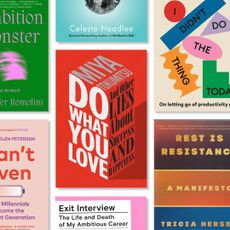 11 Books That Are the Antidote to Toxic Girlboss Hustle Culture
11 Books That Are the Antidote to Toxic Girlboss Hustle CultureThese memoirs and nonfiction titles will inspire you to focus on your personal ambitions.
By Andrea Park Published